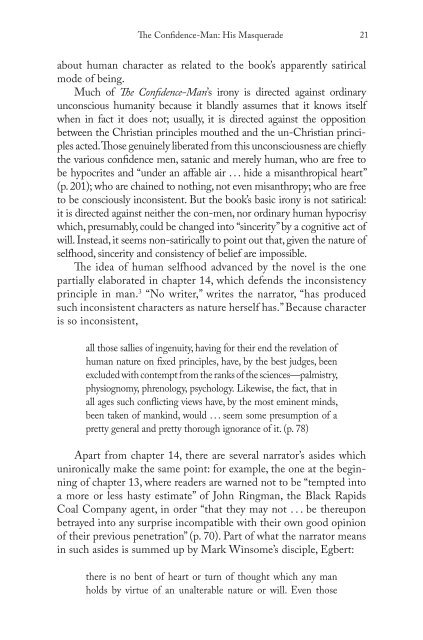Blooms Literary Themes - THE TRICKSTER.pdf - ymerleksi - home
Blooms Literary Themes - THE TRICKSTER.pdf - ymerleksi - home
Blooms Literary Themes - THE TRICKSTER.pdf - ymerleksi - home
You also want an ePaper? Increase the reach of your titles
YUMPU automatically turns print PDFs into web optimized ePapers that Google loves.
Th e Confi dence-Man: His Masquerade 21<br />
about human character as related to the book’s apparently satirical<br />
mode of being.<br />
Much of Th e Confi dence-Man’s irony is directed against ordinary<br />
unconscious humanity because it blandly assumes that it knows itself<br />
when in fact it does not; usually, it is directed against the opposition<br />
between the Christian principles mouthed and the un-Christian principles<br />
acted. Th ose genuinely liberated from this unconsciousness are chiefl y<br />
the various confi dence men, satanic and merely human, who are free to<br />
be hypocrites and “under an aff able air . . . hide a misanthropical heart”<br />
(p. 201); who are chained to nothing, not even misanthropy; who are free<br />
to be consciously inconsistent. But the book’s basic irony is not satirical:<br />
it is directed against neither the con-men, nor ordinary human hypocrisy<br />
which, presumably, could be changed into “sincerity” by a cognitive act of<br />
will. Instead, it seems non-satirically to point out that, given the nature of<br />
selfhood, sincerity and consistency of belief are impossible.<br />
Th e idea of human selfhood advanced by the novel is the one<br />
partially elaborated in chapter 14, which defends the inconsistency<br />
principle in man. 3 “No writer,” writes the narrator, “has produced<br />
such inconsistent characters as nature herself has.” Because character<br />
is so inconsistent,<br />
all those sallies of ingenuity, having for their end the revelation of<br />
human nature on fi xed principles, have, by the best judges, been<br />
excluded with contempt from the ranks of the sciences—palmistry,<br />
physiognomy, phrenology, psychology. Likewise, the fact, that in<br />
all ages such confl icting views have, by the most eminent minds,<br />
been taken of mankind, would . . . seem some presumption of a<br />
pretty general and pretty thorough ignorance of it. (p. 78)<br />
Apart from chapter 14, there are several narrator’s asides which<br />
unironically make the same point: for example, the one at the beginning<br />
of chapter 13, where readers are warned not to be “tempted into<br />
a more or less hasty estimate” of John Ringman, the Black Rapids<br />
Coal Company agent, in order “that they may not . . . be thereupon<br />
betrayed into any surprise incompatible with their own good opinion<br />
of their previous penetration” (p. 70). Part of what the narrator means<br />
in such asides is summed up by Mark Winsome’s disciple, Egbert:<br />
there is no bent of heart or turn of thought which any man<br />
holds by virtue of an unalterable nature or will. Even those

















